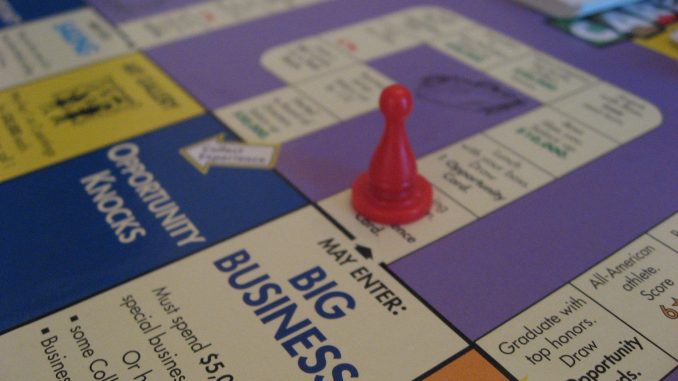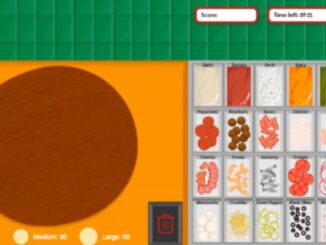
Nearly all the business learning games I have come across have involved teams competing by doing exactly the same thing as each other. By that I mean that they start in the same position and are carrying out identical activities in a series of turns. The idea of the game is usually to carry out those activities better than everyone else and ‘win’ by showing a better profit at the end.
There is, of course, nothing wrong with this, we have all been repeatedly told that ‘people like competition’, and this is true – for a great many people. However, if this is always the starting point for designing a learning game, you will inevitably end up with pretty much the same game each time.
The risks of competition
It is predictable, and I see a few problems with this:
- People who frequently attend games-based training sessions will find pretty much the same experience each time – and will consequently become disengaged.
- Competition is not always benign in a learning situation. I have seen in almost every event I have attended that it causes problems:
- Some are so concerned with winning that they ‘game the game’ to such an extent that they learn nothing.
- Competitive participants become annoyed when they are losing and turn on the facilitators or game designers – questioning the integrity of the game design and consequently learning nothing
- Competition is not always relevant to the Learning Objectives and is just put in because the games designers feel that ‘games should be competitive’. Experience and learning design is a bit like plotting a novel – don’t put anything in that doesn’t advance the plot. If it’s irrelevant or worse still, distracting, cut it out.
- Not everyone finds competition engaging. By reference to frameworks such as Bartle’s player types or Andrzej Marczewski’s Hexad, we can take a much more nuanced approach to designing for different motivations of different people

Proposed objectives of the game
I am designing a game aimed at startups with the following objectives:
- Learners will have a sufficient level of financial acumen that they can create and read basic financial records required to run a business
- Learners will have a sufficient level of business acumen that they can interpret basic financial records and metrics in order to make operational and tactical decisions with regard to running a business
- Learners will be able to demonstrate the correct use of various terms and concepts with regard to costs, working capital and the creation or destruction of value in a business
- Learners will be able to use standard techniques to measure and evaluate the impact of decisions they make in running their business
- Learners will leave with a relevant and specific action plan to apply to their business practice
A really important point made in “The Art of Game Design – A Book of Lenses” by Jesse Schell, is that the ultimate goal of a games designer is not to create games but to use games to create experiences.
This means that the disciplines of games design and instructional design are extremely congruent in their aims. The experiences which the learning game designer must create should bring about a change in knowledge, skill or attitude (a simple but sufficient definition of learning).
Business (games) as usual

The usual business game experience goes something like this, from the participant point of view:
- I have had a business idea – the same idea, coincidentally, as five other businesses also operating in the area.
- A benevolent investor has given me some money to start a business based on my idea. He has unaccountably given the identical sum of money to the other five businesses.
- I am going to operate my business for a set period of time and at the end my financial results will be compared with the other five companies.
- Each action period my company and the other five will go through a series of identical steps – although we will have some leeway to make decisions about pricing, products we make and how much to spend on stuff like advertising and marketing
- I am winning – this feels great – this means I am better at business than all the others
- I am losing – this sucks – this means that this game is badly designed and not true-to-life
- At the end of each period I have to fill in financial records and calculate some metrics
- This is great – now I understand about cashflow, profit, and ROI and so on
- I am bored – I’ve filled these in five times – I know this stuff now
- I’ll let Bob do this – I’m not great with numbers
- Oh good – I don’t need to do this – I can check my emails / twitter
- I don’t get this
- The game is completed and someone was ‘won’
- I won – that feels good – also I learnt a few things that will be useful to me
- I won – that feels good – but I’m not sure I have learnt anything that will be useful to me
- I lost – that sucks a bit, but I learnt some stuff
- I lost – and I didn’t learn anything
- Now the game / course is over and I’m going back to work tomorrow
- This was really relevant to me – I will definitely be doing things differently / better back at work
- I am unclear about the relevance of the game / course to my working life
What is wrong with this picture?

All of this unsettles me, both as a game designer and as a creator of learning interventions. As a game it sucks because it is clearly not engaging all of those who are playing. Often, this aspect is overlooked in games for learning, because unlike games which are played purely for fun, you have a captive audience.
As learning, it also sucks for several reasons:
- The rigid form of the game means that the learning is not differentiated.
- The drive to win within the game often distracts from the learning, because it is unrelated to it.
- There is often little or nothing in the way of assessment built into the game structure. While it may not be necessary to carry out formal assessment, ongoing assessment is essential to check that learning is taking place.
So my plan is to create something that is much less rigid, more participant driven and which addresses clearly the issues of differentiation and assessment for learning.
What could it look like instead?
I want the experience I create for the participants to go more like this.
- I have had a business idea – it may or not be exactly the idea I’ve got back in the real world, but I did have an element of choice. It is not the same business as everyone else in the room. I can choose to play this on my own or in a team
- A benevolent investor has given me some money to start a business based on my idea. I have had an opportunity to find out about the potential for bank loans, grants and other options.
- I am going to operate my business by interacting with the other businesses around me, some of whom will be my suppliers and some of whom will be my customers.
- There will be some things I will do in common with the other businesses, just like in real life, but many of the decisions I make will be unique to me because of the kind of business I am running.
- It is not relevant to compare my performance to others in the room, because we are not running equivalent businesses, but there is plenty of opportunity for me to measure my own business performance against earlier results.
- I am networking and working with the others in the room to meet my business (game) goals, and am also making connections I can use in the real world, this includes access to mentors, coaches and business services. The Bank within the game is run by someone who actually works in a bank, for example.
- My business goes through a number of action / accounting periods at the end of which I post financial results and learn how to interpret some simple financial metrics
- I am doing better than I did in the previous round. That’s great. I’ve learnt from my mistakes
- Oops, my results are getting worse. I will have to look again at the decisions I made to see where I went wrong, and what I need to do differently in the next round.
- I use the financial records and metrics to make decisions about how to run my business to improve my results for the next round
- This is great – now I understand about cashflow, profit, and ROI and so on
- I’m enjoying this. Let’s see what I can do to get even better results next round
- I’m not great with numbers, but I need to do this because it will help me to improve my profit / decrease my working capital / be more sustainable next round
- I’m not really getting this, but there are plenty of people in the room who have expert knowledge, and I can use them as ‘advisers’ in the game, and I have time to learn what they are showing me and then apply it myself
- Each round the decisions I make are increasingly complex. This maintains the challenge I feel in the game. I have opportunity to repeat material from previous rounds if I want to, but equally I can skip these if I feel I have mastered something
- I can really tailor this game to what I need from it
- The complexity maintains interest rather than feeling threatening
- I have freedom to decide the goals I want for my business within the game. I can grow or consolidate, innovate or exploit. I decide what success looks like, not the game.
- My business and values are not the same as everyone else’s – this experience reflects that back to me
- The game is more meaningful to me because the choices I am making actually matter to me
- I can play the game at my own pace. I am neither waiting for others to complete tasks, nor am I feeling hurried.
- I am neither bored nor over-challenged. This makes this game an enjoyable experience
- If I get what I am supposed to be doing, I can challenge myself by moving on and immerse myself in the game. If I am stuck, I can step outside the game and find some help.
- This is a safe space in which I can try things out
- Help is available to me
- There is time to reflect and listen to the experiences of others, both about the game and their real life work
- I feel I have been given the chance to consolidate what I have learnt and think about its relevance
- I have had the opportunity to hear about best practice, and to learn from the mistakes of myself and others
- Now the game / course is over and I’m going back to work tomorrow
- I have clear action plan of the next steps I need to take to achieve what I want in my business
- What I take away from this is relevant to me, because I took the experience I wanted and needed from the menu on offer
- I’ve met some people who I’m definitely going to look up on LinkedIn

Next steps
Right, so that’s the hard bit out of the way. I can now picture in my head the experiences I want to create. Now the easy bit (haha) – pick out the game mechanics and bits of story which will facilitate the experiences.
I might find in a few hours or a few days that this idea is a complete non-starter – and that there are very good reasons why all business learning board games run in much the same way. I suspect that I may know the major one already – that a free flowing game such as I want to create is going to be much more challenging to run for an instructor / facilitator – and potentially too expensive to create and run, for it to be a viable proposition. However, this doesn’t matter – nothing is irrevocable, and if I have to backtrack – so be it. Even if I am only able to implement some of the improvements on the classic business game, it will be a step in the right direction.
- James Bore – The Ransomeware Game - 13th February 2024
- Ipsodeckso – Risky Business - 23rd January 2024
- Review – Luma World Games - 15th December 2023





Be the first to comment